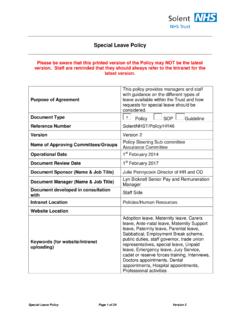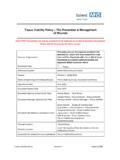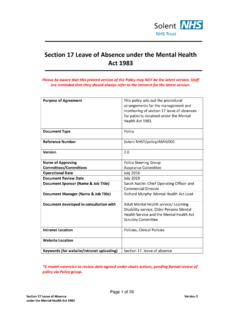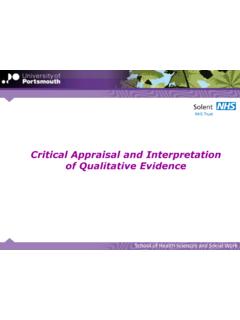Transcription of Solent NHS Trust
1 Introduction Solent NHS Trust is the NHS provider of therapy services (Speech & Language Therapy, Occupational Therapy, Physiotherapy) for children and young people, 0 19 years in Hampshire, Southampton and Portsmouth. This referral pack provides information to referrers on the context in which the Children s Therapy Service operates the criteria and guidelines for referral, the referral procedure and how to contact the service for further information and advice. Context In order for children to grow and develop to their full potential all children need to be surrounded by an environment (family, home, early years staff, schools) that provides rich opportunities for them to learn, communicate and develop physically.
2 Whilst most children given these opportunities will develop as expected, many children will find it harder, with some experiencing a delay in their development, whilst others will present with more complex difficulties that will significantly affect their ability to make friends, learn and manage on a day to day basis. The therapy service aims to work with parents, health and education professionals in supporting the development of all children. We try to ensure that parents have access to information about how to support their child to develop, what to expect and whether to be concerned.
3 We provide training and advice to health visitors, early years workers and school to ensure that they have the knowledge and skills to provide rich opportunities for development. We provide resources, leaflets, therapy ideas, training and screening checklists to enable health and education staff to support children with mild to moderate difficulties wherever possible and as a result anticipate that many children will be supported by those people who know the child best and spend time with the child on a daily basis. There are, however, some children who either do not respond to this early intervention or who need more specialist support.
4 These are the children who may need to see a qualified therapist who will be able to assess the child and identify their needs, discuss and agree with parent and health/ education professionals how best to meet those needs and monitor response to intervention to inform further planned input. The following guidelines explain which children may need this specialist support and how to access it. Who should I refer? Children and young people aged 0 19 years who have a Hampshire, Southampton or Portsmouth GP or who attend a Hampshire, Southampton or Portsmouth school. Children who present with a complex or disordered (uneven) profile of development Children whose needs cannot be met by those who work closely with them Speech & Language Therapy Children and young people who present with speech, language, communication and / or eating and drinking difficulties as outlined in the Early Years Developmental Checklist and Schools Therapy Pack.
5 This includes difficulties with: Understanding spoken language Using spoken language Developing speech sounds Social communication Stammering Voice husky or hoarse (referral to ENT is required prior to referral) Eating and drinking (This refers to the process of eating, drinking and swallowing rather than in children choosing to eat a restricted diet). Please complete the Feeding Questionnaire and attach it to the referral form. Children with mild / moderate speech and language difficulties will be supported by the HCC Early Communication Support Service in Hampshire. Please refer to Appendix 1 for more specific guidance.
6 Occupational Therapy Children and young people who present with difficulties with postural-motor, perceptual-motor or motor planning function which affects their ability to develop and perform gross and fine motor skills, pre-writing and handwriting skills and activities of daily living or with underlying motor difficulties which result in: difficulties with seating and positioning undertaking activities of daily living such as o dressing o eating o handwriting o school activities o self care and independence Children who present with primary emotional and behavioural difficulties not related to any underlying motor dysfunction should not be referred.
7 Please refer to Appendix 2 for more specific guidance. Physiotherapy Children and young people who present with any condition which impairs their physical development and therefore may affect functional physical potential. This includes: Moderate severe delays with gross motor skills Difficulties with mobility moving around the floor, moving between sitting and standing, walking, running (dependent on the age of the child) Difficulty with maintaining symmetrical postures Poor balance in sitting or standing Abnormal walking pattern Abnormal movement patterns Reduced muscle power Limited range of movement patterns / poor quality of movements Please refer to Appendix 3 for more specific guidance.
8 How do I refer? The Children s Therapy Service will receive referrals from anyone, including parents. Referrals should ideally be made on the Children s Therapy Service referral form to ensure that all the information required to process the referral is provided. Referrals will also be accepted in writing and over the telephone. Referrals may be made to one therapy service or all three therapy services on the same form by ticking the appropriate boxes. The child s parents or guardian must consent to the referral. Please attach supporting evidence to the referral form where appropriate Feeding Questionnaire, Early Years Developmental Checklist, Child Monitoring Tool (KOT or ECaT).
9 All school referrals must be accompanied with forms and supporting information from the Schools Therapy Pack. All referrals should be sent to: Children s Therapy Service Better Care Centre William Macleod Way Southampton SO16 4XE Email: Tel: 0300 300 2019 Parents may also attend any of the drop-in clinics advertised without a referral. For further advice on when to refer, please contact the Children s Therapy Service telephone advice line on 0300 300 2019 What will happen next? Once received the referral will be processed within five working days to: check that all required information has been provided and parental / guardian consent obtained.
10 If further information is required the referral will be put on hold pending receipt of further details. determine the level of complexity of the referral and need for an integrated assessment allocate the referral to the appropriate therapist or team. Once processed, the parents / carers will be contacted to arrange an appointment for the child to be seen at the most appropriate location clinic, early years setting, school or home. The child will be prioritised according to need and seen within 12 weeks of acceptance of the referral. At the initial appointment the child and parents / carers will be seen by a qualified therapist who will ascertain from the parents/carers (and others where appropriate early years setting, school) the child s presenting difficulties and their own particular concerns undertake an initial assessment to identify the child s level of functioning agree with parents / carers an appropriate course of action with the consent of parents / carers, communicate that course of action to the referrer and other interested parties health visitor, GP, early years setting, school, consultant.
















